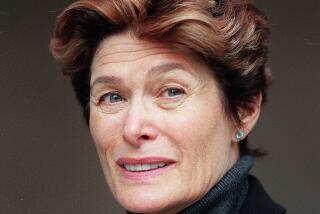Commentary : WHY IS EVERYBODY ALWAYS PICKING ON ‘QUINN’?
- Share via
What has poor, sweet Jane Seymour done to anybody?
Why has her wholesome, family-oriented Saturday night Western--”Dr. Quinn, Medicine Woman” --increasingly become the butt of jokes on prime-time and late-night TV?
Hey, why not? She’s an easy target. Tough town, baby.
The mini-phenomenon of Quinn-bashing illustrates the schism between the hip and the unhip on television--as defined, of course, by the hip. “Dr. Quinn” is squeaky clean, romantic and not all that deep. It is unapologetically artless and affirming. In a word, it is square. On the other side are the snide and smart-alecky late-night talk show quipsters like Letterman and Leno. And the self-aware arbiters of the cynical generation, like “The Simpsons” and “Murphy Brown.”
The chief harasser over the past couple of years has been David Letterman, whose trademark gags are fuguelike in their repetition. Last week, he did a “Top 10 Ways CBS Will Be Different Now That It’s Owned by Westinghouse.”
The No. 1 way was: “Five words: ‘Dr. Quinn, Refrigerator Repair Woman.’ ”
On a recent “Simpsons,” Homer was upset that Marge was going out without him on a Saturday night. When she asked him what he had planned if she stayed home, he said, with terribly hurt feelings, “Oh, I don’t know. Maybe a little show called ‘Dr. Quinn, Medicine Woman.’ ”
“Dr. Quinn’s” producers know that there’s no such thing as bad publicity. They love the attention. The Mad magazine parody of the show, “Dr. Quack,” hangs in a frame in the show’s Los Angeles office.
“It’s a very politically correct, wholesome family show which opens itself to a lot of criticism from cynical people,” said the show’s publicist, Kevin McDonald. “Usually, cynical people tend to be comedians and comics.”
You bet, said David Mirkin, executive producer for “The Simpsons.”
“Whenever you have a show that is perceived to be very pure and innocent, it needs to be destroyed from the outside,” he said. “It needs to be cynicized and attacked (and) tainted with satire.”
“Dr. Quinn” probably brings some of the hectoring on itself by kowtowing to the market forces that drive the TV industry.
One day last November during a “sweeps” week--the periods each year when networks scream for viewers because advertising rates are based on that period’s ratings--”Dr. Quinn” was scurrying for some publicity and tried to get Seymour on Jay Leno one night. Leno was booked but the inventive folks at “Dr. Quinn” offered, “What if Jane just runs on in costume and patches Jay up?” So that night, during the show, Leno pretended to hurt his finger. Out rushed Seymour, in full costume. She put a Band-Aid on Leno’s finger, kissed it and ran off. Her show got attention; Leno, Letterman et al. got more material.
Another reason, probably, is what you might call the unconventional casting of the show. Seymour has made a career in soft focus, from her earliest days as Solitaire, the tarot-card-reading waif in the James Bond film “Live and Let Die.”
She went through a series of average-to-good movies where her chief asset was her Victorian hyper-femininity. She is now a sort of arch-rival of Martha Stewart, having published her own “Guide to Romantic Living” in opposition to Stewart’s “gracious living” industry. Casting her as a female physician on the late-19th-century American frontier is a little like casting Nicole Kidman as platoon leader in a World War II movie. One almost expects Laura Ashley throw pillows in the town jail.
Yet the show is a success, re-establishing the western genre and the Saturday night prime-time slot, which probably galls the cynics even more. The show is discussed vigorously by adoring fans on the Internet, many of whom receive a quarterly fan newsletter.
More to Read
The complete guide to home viewing
Get Screen Gab for everything about the TV shows and streaming movies everyone’s talking about.
You may occasionally receive promotional content from the Los Angeles Times.






